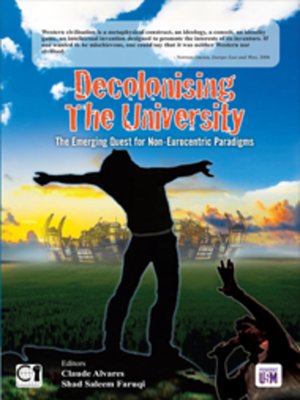Decolonising the University
ebook ∣ The Emerging Quest for Non-Eurocentric Paradigms
By Claude Alvares

Sign up to save your library
With an OverDrive account, you can save your favorite libraries for at-a-glance information about availability. Find out more about OverDrive accounts.
Find this title in Libby, the library reading app by OverDrive.



Search for a digital library with this title
Title found at these libraries:
| Library Name | Distance |
|---|---|
| Loading... |
This book of essays is a sequel to the 'International Conference on Decolonising Our Universities' held in Penang, Malaysia from June 27 to 29, 2011. The Conference was jointly organised by the Universiti Sains Malaysia and Citizens International in cooperation with the Higher Education Leadership Academy of the Malaysian Ministry of Higher Education. At the Conference, speaker after speaker pointed out that education in Asia and Africa is too Westcentric. It blindly apes European universities, European curricula and European paradigms. The papers in this volume examine possible ways of overcoming this problem of intellectual enslavement in Asian and African citadels of learning. It must be pointed out at the very outset that this book is not meant to be a tirade against the West. Its aim is not to ask Asian and African universities to shut out Europe and North America or to be insular or to wear blinds. Its aim is positive—to make Asian and African tertiary education truly global and at the same time socially relevant. This cannot be done unless the intellectual monopoly of the West is broken and European knowledge is made to make way for the review, teaching and expansion of the vast knowledge of other societies and cultures. European knowledge may supplement, but never replace, other valid knowledge systems and traditions. In preparing this volume, we received invaluable help from many individuals and institutions. Universiti Sains Malaysia and Citizens International provided the funds for publication. Ayesha Bilimoria helped with the editing of the bulk of the pieces. Jenessey Dias performed brisk transcription of the presentations from the DVDs. Shafeeq, Sameera and Noor Aini Masri gave secretarial assistance. Professor Dato' Dr. Md Salleh Yaapar and his team from the USM Press did everything else with great courtesy, speed and professionalism. Citizens International's S.M. Mohamed Idris and Uma Ramaswamy assisted with the printing. To all of them we owe a debt of gratitude. We hope that this book will highlight what is on any measure a shameful condition and that it will inspire at least some Asian educators to think afresh, to chart new directions, to search for the best in their indigenous traditions, yet to keep the windows of their mind open to the world.







